Bergman & Rossellini "Journey To Italy"
 Tuesday, August 25, 2015 at 8:20PM
Tuesday, August 25, 2015 at 8:20PM Our Ingrid Bergman Centenary Celebration finally continues (sorry for the hiatus) with Nathaniel on Journey to Italy (1954)
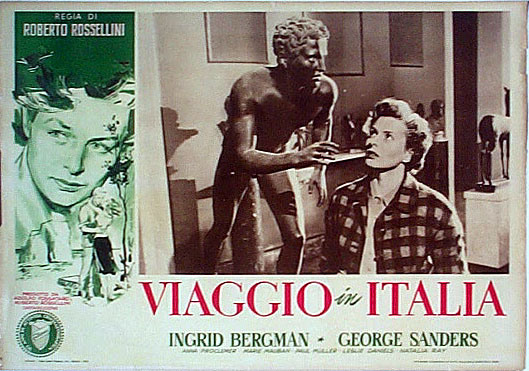
The opening lines of Roberto Rossellini's marital drama Journey to Italy go like so
Mr Alex Joyce: Where are we?
Mrs Katherine Joyce: Oh I dont know exactly.
The Joyces (George Sanders and Ingrid Bergman) are not yet talking about their marriage, but also: they are. Were the Rosellinis also examining their marriage through play acting marital drama? Who is to say. But Where They Were is just as important in our mini-history of Ingrid Bergman's career.
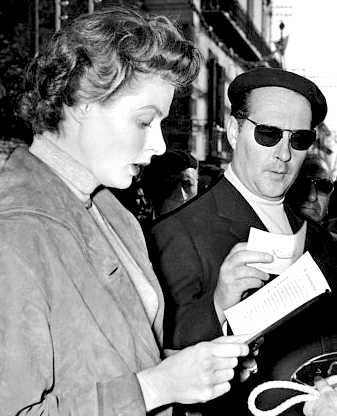 In 1949 while filming Stromboli (1950), Ingrid and the director that she was already a fan of (in short: she had written him a fan letter and he had countered with by writing her Stromboli) fell in love and got pregnant. Both were already married and the scandal was immense... at least in the US. Even the Senate got into it denouncing Bergman for her "immorality." They quickly divorced their spouses and married each other and Bergman journeyed to Italy to stay...
In 1949 while filming Stromboli (1950), Ingrid and the director that she was already a fan of (in short: she had written him a fan letter and he had countered with by writing her Stromboli) fell in love and got pregnant. Both were already married and the scandal was immense... at least in the US. Even the Senate got into it denouncing Bergman for her "immorality." They quickly divorced their spouses and married each other and Bergman journeyed to Italy to stay...
For the next six years and five films, unwelcome in her adopted country of Tinseltown, Ingrid only worked for Rossellini. This was quite an immediate shift in her filmography from glossy prestigious studio pictures, some brilliant some not, to auteur-driven Italian neo-realism. By the time they made Journey To Italy, a slow observational drama about a couple considering a divorce... were they?
Journey to Italy was not their last film together, but by 1957 they were divorced and Ingrid was back in Hollywood's good graces with the comeback success of Anastasia for which she won Oscar #2.
So what begins as a trip to Italy within the movie to sell an Italian home that once belonged to Katherine's Uncle, quickly turns into a sad Where We Stand Now rethink of the Joyce's unhappy coupling. I'll readily admit that I couldn't quite connect with its mix of travelogue beauty and marital ugliness or the way it toggles between minor mundane squabbles and bold symbolism (their house has a direct view of recently erupted Mount Vesuvius, and they even watch archaeologists uncover an ancient dead couple in Pompeii). What's more I didn't buy its oddly "happy" ending, but what was interesting about the picture was the projected friction between Ingrid's personal life and her professional persona.
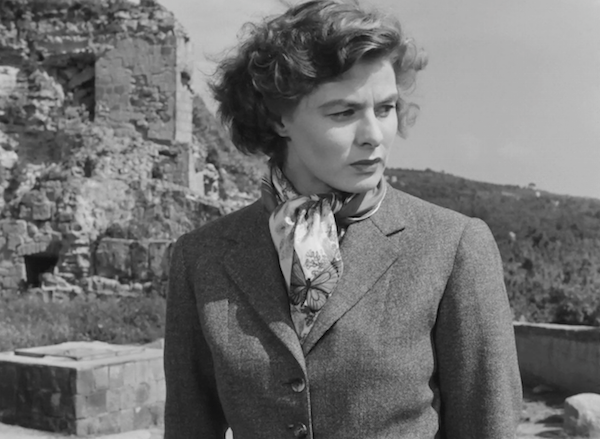 Note the butterfly scarf - foreigns abroad are always transforming in fiction
Note the butterfly scarf - foreigns abroad are always transforming in fiction
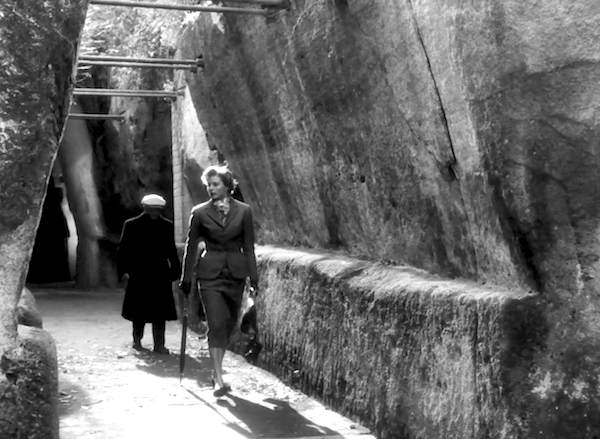 The Catacombs "where lovers came to question the city about what the course of their love would be"
The Catacombs "where lovers came to question the city about what the course of their love would be"
All throughout the picture, Katherine/Ingrid finds herself drawn to museums and ancient ruins, and seems to be willing herself to commune with the art itself. One particularly bold sequence has her staring straight into the spooky eyes of old sculptures. Sometimes she stares back and her face is an ambiguous mask, at other times she crumbles with fear or irritation or finds delight. And wouldn't this be the case with Ingrid Bergman and her own work? At some point in all legendary long careers, The Movie Star is no longer just acting but acting in conversation with their familar established persona, their art.
We know from interviews with her children, that Ingrid Bergman wasn't exactly a present mother. She loved to work, loved it (by all accounts) more than staying home to play mother or wife. In fact, part of the "immoral" scandal of her marriage to Rossellini was that she left her first child behind to move to Italy for the love affair. But her children all have warm memories of her from "magical visits" nonetheless as evidenced in interviews and the recent documentary Ingrid Bergman - In Her Own Words.
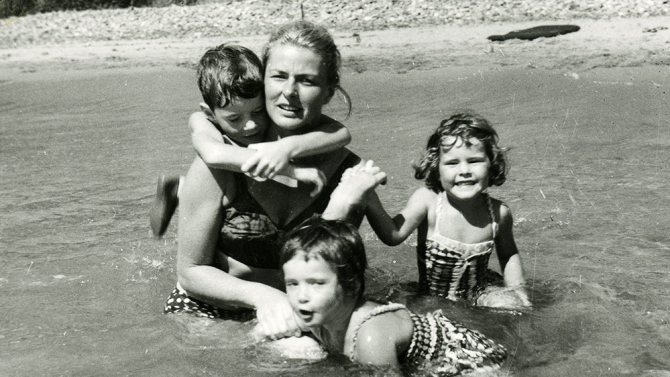 in the mid 50s with her three children from Rossellini
in the mid 50s with her three children from Rossellini
It's easy, while watching Katherine's spiritual or reluctant or sad or happy reactions to art, to think of Bergman's own fascination with acting and cinema. She continually sought out challenging directors, acted in multiple languages, in multiple countries and tried different styles, some more successfully than others.
One argument between Katherine and Alex is pinpoint precise even if you're forgetting about the movie before you entirely and thinking of the screen personas of George Sanders and Ingrid Bergman. She berates him for being a know-it-all "there's always criticism in your eyes" which exactly describes Sanders' most famous roles. He complains about her "lack of a sense of humor" and her "romanticism" which describes the bulk of her gallery of heroines.
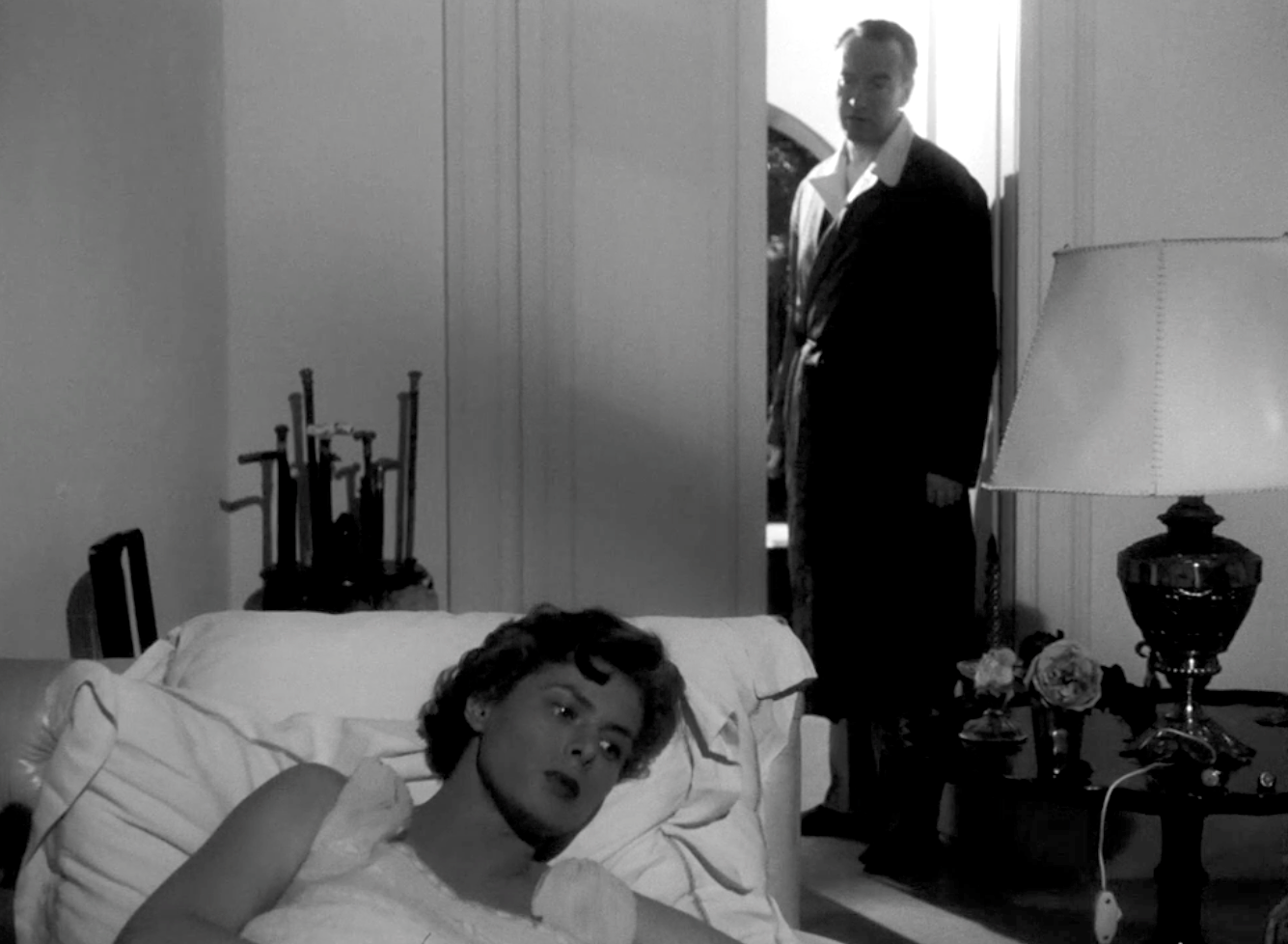 Wedded Unbliss
Wedded Unbliss
Not that Bergman couldn't sell a light note -- as we'll see very soon in our Centennial celebration. In fact, she gets a few laughs from scowls right here. There are two separate scenes in Journey to Italy where she lightens the mood by darkening her own in petulant disgust at seeing happy couples all around her or remembering something her husband did and mumbling "I hate him," under her breath.
Bergman once described her work with Rossellini as "noble failures," and though the reputation of their films beg to differ, I'm not sure that I do. At first glance (I had never seen it) it's more a film to admire and think over than to actively enjoy or really connect with. Yet, despite its unhappy non-cathartic doldrums, it makes beautiful use of Bergman's expressive face in both its blank ambiguous glamour and its flashes of expressive moods.
Early in the movie, older men flirt with Mrs. Joyce at a party, and she plays along laughing gaily (in part to annoy her husband?). One of them says:
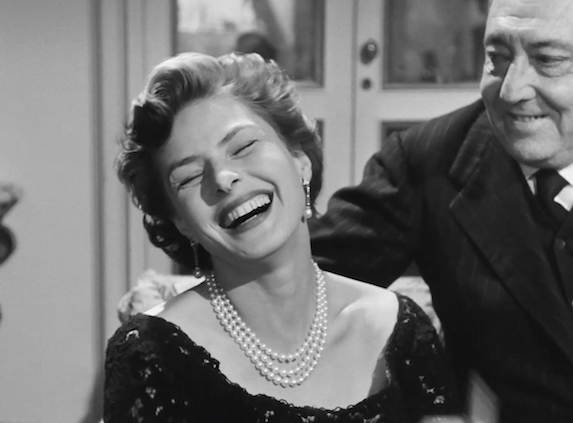
When I look into your eyes, they're like stars in the night"
Though they've just met this isn't empty flattery. Not a soul who has ever been bewitched by Ingrid Bergman in closeup would disagree.



Reader Comments (9)
This is the segment of Ingrid's filmography that I'm the least familiar with, though I'll be correcting that later this week when her day-long tribute comes up on TCM and they are showing several Rossellini films, but I have seen this one.
It's not a great film but Bergman and Sanders make an interesting paring a add whatever value the film has. Well there's some beautiful scenery as well but the script is no great shakes.
@joel6 - I, too, have seen just this film when it comes to the Bergman/Rossellini collaborations, and I already have my DVR set to record what TCM is showing. It's going to be fun day.
As for Journey to Italy, I can see why you guys didn't feel too connected to the story or the movie. I've found that Rossellini is an overrated director, but he does show flashes of greatness in the films of his that I've seen. Besides the interplay between Bergman and Sanders, I really enjoyed the scene where the Pompeii couple is uncovered. I could be wrong, but I seem to remember Bergman turning to Sanders to shield herself from the ghastly sight. This occurs after the two have fought bitterly and have decided to break up. Like the rest of the ending, it seemed to say that they could still be friends, or would at least remember the times (and the real-life children) they had together fondly. I don't know, I like movies about disintegrating relationships (i.e. Contempt) and how close two people can or cannot be after a break-up. I'd say this is a good movie with very good acting, but it isn't great like some of Bergman's other films.
Though unlike others, I've never ranked this among my favourite films, I still find it beautiful and extremely easy to connect to the story, so I'm a bit confused by this reaction. It's such a sensitive and wise portrait of a crumbling marriage and I adore the way Rossellini uses the setting to comment on it. It isn't subtle but it's elegant and often very moving.
As for the ending, it's one of those common 50s cases where you just switch off the film 2 minutes before the credits.
Rossellini actually has never been among my absolute favourite Italians and even in his best work, I feel individual sequences carry a greater impact than the overall film. That said, I find his films improve with repeated viewings. And I recently came across a semi-documentary obscurity he made in Indian in the late 50s, called "India Matri Bhumi", and it absolutely left me breathless. I also recently saw and quite liked "The Rise to Power of Louis XIV", which can get a bit trying at times, but as an evocation of 17th century France, it's absolutely like no other.
Now I am intrigued to watch this. I caught just a bit of it on TCM several years ago during a Bergman tribute. I was astonished at how sharp the print was. Ingrid looked enchanting as always. I'd watch her in just about anything. I really miss having TCM. I believe this is on Criterion so I'm in luck.
It's an amazing Bergman performance and a very good film, highly influential for many filmmakers including Antonioni. Beautiful use of landscape and its history/myth as character and evocation of mental state (coined "psychotopography"). The ending has to be seen in the context of Rossellini's deep spirituality, which is overt and perhaps unconvincing to some but has a kind of transcendent quality that makes it seem very pure.
thanks for writing about this film, nathaniel. i have to confess that this is a bergman i haven't seen, but it makes me very curious. i read that she is probably considered the first truly international movie star since she appeared in films speaking swedish, english, italian, and german. just look at that smile in the last picture! there's a reason we're celebrating her centennial!
Jonathan - i wish i could relate to that ending but it seemed in direct opposition to the film that came before it. anyway, i will admit that i haven't stopped thinking about the movie since seeing it a few days ago so perhaps it's the sort that grows on you. very slow though.
This movie was included in SIGHT-SOUND 'S list ,and it ranked as high as 43 in a list of 250 movies . I Suposse european moviegoers and critics enjoy this film ,much more than americans . what was really special about her career was that she made european and american classics . As her daughter said in a recent interview ,unlike Hepburn or Davis .or Crawford or Stanwyck , her career was international . that's why her career and body of work will always be analized and reviewed . And besides ,she managed to work with an impressive list of directors :Cukor ,Hitckoc,Leo McCarey ,Rossellini ,Renoir ,Ingmar Bergman . She spoke five languages ,won three oscars (she should have won for Notorious and Autumn Sonata ) ,and she was gorgeaus and sexual .This woman had everything .
I really like her work with Rossellini. I will rank the three films Stromboli, Europa 51 and Journey to Italy higher than his War trilogy. Journey of Iraly is now regarded as one of the first modern films. The cheers from the French new wave auteurs like Godard, Rohmer, Chabrol sealed its reputation as a classic.